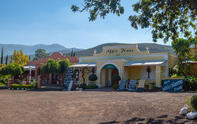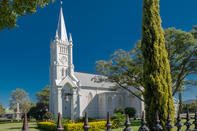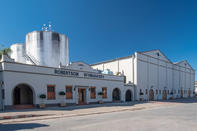Farming Town
The town of Robertson was founded in 1853 (originally named Hooprivier) by two friends: Dutch Reformed Church minister at Swellendam, Rev. Dr. William Robertson and Joseph Barry, an auctioneer.

The town’s founding coincided with the Cape Colony receiving representation in the British government. Before the town was founded, the governor of the Cape, Simon van der Stel, developed the farming lands in the region around 1679.
He wanted to provide safe passage for the French Huguenot wine farmers to the Cape.
In 1728, a large quantity of land was let to a Mr. P Joubert. Other farmers were attracted to the region as it had fertile land and was good for grazing sheep. By the 1800’s, many farmers purchased land from the government.
The oldest manor house in the region was built in 1812 on the farm Orange Grove, as well as a mill house that supplied wheat flour to nearby farmers. Some of the original farm names are still intact, such as De Hoop, Roodezant, Goudmyn and Le Chasseur.
Churches

The town was named ‘Robertson’ in honour of an evangelistic Scottish minister who held church services in the Overberg for over 39 years. He would visit the region every three months, starting in the 1840’s. In 1852, the minister Robertson purchased a part of the Over het Roode Zandt farm on behalf of the Church Council.
In 1853, Robertson was officially founded as a ‘dorpsgebied’ (township) and 199 plots were auctioned off by aforementioned auctioneer Barry. Each plot was taxed, and the money went to the building and maintenance of the first Dutch Reformed Church. The church was erected in 1856, but the tax only ended in 1951.
The town was approved a few months after its inception by the Colonial Government. At the beginning of the 19th century, there were no established English churches in the Overberg region, so the Dutch Reformed Church held services in both English and Afrikaans. The Robertson congregation grew rapidly over the course of the century. Soon, more churches sprang up. The Wesleyan Church was built in 1851 and stood out for its pink walls.
St. Mary’s was a small Anglican Church built in 1867, which catered to English speakers. By 1881, Roberston welcomed the first members of the Jewish community. The Robertson Hebrew Congregation was established in 1895 when the community built the Knesset Israel Synagogue and Talmud Torah. In 1907, a separate church was built for ‘non-Europeans’. This led to a large, diverse community of locals in Roberston.
Agriculture

Wine farming in Robertson picked up speed when the Cogmanskloof pass connected the farmers with Montagu in 1877. This allowed the Barry & Nephews distillery (from Montagu) to share their spirits with the Robertson region. Wine trade skyrocketed in the Robertson district, and Barry & Nephews opened a second distillery in Robertson. In 1865 they sent a sample of their spirits to the Paarl Agricultural Show, and walked away with the prize for the best spirits of wine.
By the mid-1800's, sheep and mixed farming were popular in the Robertson district. In 1884, Ernst Marais of Wonderfontein was granted an agricultural brandy distillers license and from then on the industry grew. In 1918, the KWV was founded in the Cape, and they built premises in Robertson in 1941. Ostrich farming was introduced in the area in the 1920’s, but the market collapsed during World War 1. Farmers then switched to fruit, dairy and grain farming.
By the 1980’s, dairy and grain were replaced by vineyards. Wine farming was always prominent in the Robertson district. The Robertson winery became the first to produce wine in the country that was accredited with an ethical seal that audited that fair labour practices, in line with international standards. Today Robertson has some of the top wine estates and cellars in South Africa. The region boasts with some of the best wines in the world, receiving consistent international accolades.